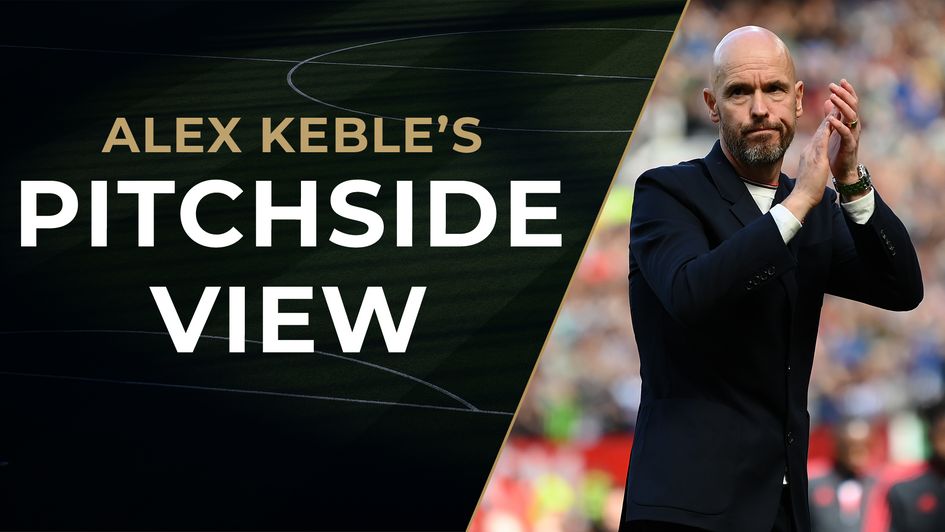Alex Keble shines his tactical spotlight on Manchester United v Liverpool, suggesting reasons for United to be 'cautiously optimistic' ahead of MNF.
Retrospectives produced to coincide with the Premier League’s 30th anniversary have provided a warming reminder of the division’s unique appeal as a glossy and brightly-coloured blockbuster product.
Its ability to conjure unlikely storylines and to endlessly reinforce the brand with resplendent moments of glory and failure is no small part of that, which is why Manchester United versus Liverpool on Monday night is such a timely fixture amid the celebrations.
Few anticipated Erik ten Hag’s revolution would face such dark days so soon; would have believed United could sink even further into the abyss this summer.
From their desperation in the transfer window to the catastrophic performances against Brentford and Brighton, Man Utd’s car crash August is in keeping with the traditions of the Premier League: engrossing, cinematic, irresistible.
Liverpool cannot compete with that, but nevertheless they are already producing their own fascinating subplot following dropped points against Fulham and Crystal Palace.
The last team to lift the title despite failing to win either of their opening two matches was United in 2007/08, which is roughly half of the Premier League’s 30-year history away and a virtually incomparable era. It now takes significantly more than 90 points to win the competition. Liverpool might already be out of the race.
That would certainly be the case if they fail to beat Man Utd on Monday evening, which of course is nothing compared to the repercussions Ten Hag would face if he makes it three defeats from three.
If that wasn’t enough to leave the match fascinatingly poised, the tactical battle looks set to teach us plenty about the future of both clubs.
Ten Hag underestimating PL challenge
Ten Hag is not blameless in Man Utd’s disastrous start. Adapting from the more forgiving Eredivisie to the brutality of the Premier League – both the physicality and the psychological warfare – was always going to take time, yet the early signs are that the Dutchman has underestimated the challenge.
Against Brentford, he failed to anticipate how Thomas Frank would pump long balls up to Ivan Toney and Bryan Mbeumo, playing Lisandro Martinez in a high line.
Against both Brentford and Brighton, he failed to anticipate how their hard pressing would likely unsettle United defenders new to his Ajaxian concepts (and new, perhaps, to the concept of coaching itself). To put faith in David de Gea’s distribution is alarming.
To play Christian Eriksen first as a false nine and then as the deepest central midfield is naïve to the point of baffling.
Ten Hag will not misuse Eriksen in this way again, but with De Gea staying put Liverpool will know to press extremely aggressively whenever United have the ball in their own third.
Mimicking Brentford and Brighton, we can anticipate a man-for-man pressing system in these moments in the hope De Gea is encouraged to play dangerous passes or, at best, concede possession with anxiety-inducing clearances that give Liverpool the psychological edge.
Reason for optimism for United
It doesn’t take a genius to work out this is the most likely pattern of the match: Liverpool domination, a blur of bodies, and another timid collapse from a Man Utd team incapable of building out from the back. But there is reason for United to be cautiously optimistic.
For starters, Darwin Nunez’s suspension means Martinez won’t come under the same sustained pressure as he did at Brentford, while injuries to Roberto Firmino and Diogo Jota could leave Klopp with a disjointed and unfamiliar front line.
This may give United the platform to build their way into the contest and, with a naturally more conservative setup than in their first two games, create a more claustrophobic and even encounter than most are expecting.
More significantly, Anthony Martial returns for Man Utd at just the right moment to capitalise on Liverpool’s key weakness over the first two weekends of the campaign.
At Fulham, Thiago Alcantara and Jordan Henderson just couldn’t find their feet, leading to the introduction of James Milner and Harvey Elliot in the second half, who both darted forward superbly to turn the balance of play in Liverpool’s favour prior to Virgil van Dijk’s clumsy penalty concession.
With Thiago injured, Elliot and Milner started against Crystal Palace and neither looked comfortable coping with Patrick Vieira’s quick transitions. Milner in particular showed his age, regularly getting caught ahead of the ball and failing to cover the wide areas when Palace launched a counter-attack through Eberichi Eze, Jordan Ayew, or Wilfried Zaha.
United’s excellent pre-season form was defined not by their considered short passing triangles out via De Gea (although these were present), but by the way Ten Hag fused a possession-centric approach with sudden changes of tempo to utilise the speed and fluidity of his new-look front three.
That has not been possible with Eriksen or Cristiano Ronaldo in the central role, but with Martial flanked by Marcus Rashford and Jadon Sancho there is a chance this will return.
Liverpool’s tendency to dominate the ball for long periods will inevitably force Man Utd into a deeper game, naturally creating an opportunity for the hosts to counter-attack in the gaps behind Milner and Jordan Henderson (likely to come in for Elliot) via Martial, Sancho, and Rashford.
It’s a long shot, of course. United’s low self-esteem and Liverpool’s recent history of dominating this fixture by pressing high, hard, and early – they won by an aggregate of 9-0 in the two matches last season – means they are strong favourites.
But the Premier League is never that predictable, and on its 30th birthday we ought not to forget that the shock result, the bigger story, is so often the way things unfold.
